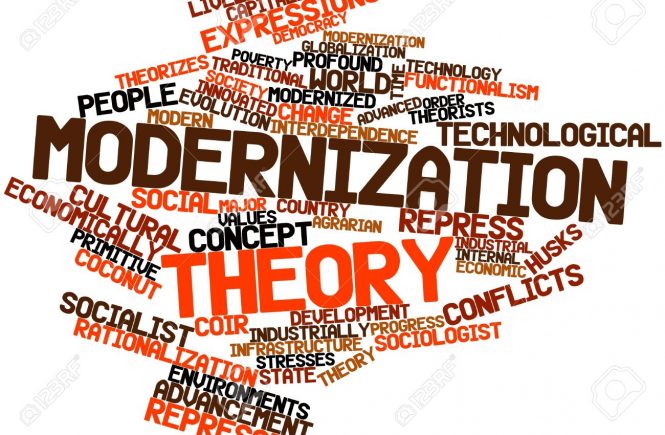Complementary to the doctrine of ‘free flow of information‘ in the post-war years was the view that international communication was the key to the process of modernization and development for the so-called ‘Third World’. Modernization theory arose from the notion that international mass communication could be used to spread the message of modernity and transfer the economic and political models of the West to the newly independent countries of the South. Communications research on what came to be known as ‘modernization’ or ‘development theory’ was based on the belief that the mass media would help transform traditional societies. This promedia bias was very influential and received support from international organizations such as UNESCO and by the governments in developing countries. One of the earliest exponents of this theory was Daniel Lerner, a political science professor at the Massachusetts Institute of Technology, whose classic work in the field, The Passing of […]
Free flow of information
Free flow of information, After the Second World War and the establishment of a bi-polar world of free market capitalism and state socialism, theories of international communication became part of the new Cold War discourse. For the supporters of capitalism, the primary function of international communication was to promote democracy, freedom of expression and markets, while the Marxists argued for greater state regulation on communication and media outlets. The concept of the ‘free flow of information’ reflected Western, and specifically US, antipathy to state regulation and censorship of the media and its use for propaganda by its communist opponents. The ‘free flow’ doctrine was essentially a part of the liberal, free market discourse that championed the rights of media proprietors to sell wherever and whatever they wished. As most of the world’s media resources and media-related capital, then as now, were concentrated in the West, it was the media proprietors […]
Approaches to Theorizing International Communication
Theories have their own history and reflect the concerns of the time in which they were developed. This chapter examines some that offer ways of approaching the subject of international communication and assesses how useful their explanations are in terms of an understanding of the processes involved. This is by no means a comprehensive account of theories of communication (see McQuail, 1994; Mattelart and Mattelart, 1998), nor does it set out an all-embracing theorization of the subject, but looks at the key theories and their proponents, which together with the preceding chapter on the history of international communication, should help to contextualize the analysis of contemporary global communication systems in subsequent chapters. It is not surprising that theories of communication began to emerge in parallel with the rapid social and economic changes of the Industrial Revolution in Europe, reflecting the significance of the role of communications in the growth of […]
International Communication at the End of the Cold War
If the East-West ideological battle characterized the Cold War years of international communication, the fall of the Berlin Wall in 1989 and the breakup of the Soviet Union two years later, transformed the landscape of international politics, profoundly influencing global information and communication. Television played an important role during the 1989 revolutions in Eastern Europe. (Ash, 1990), helping to bring the East-West ideological division of Europe to a close. The transition to capitalism was largely peaceful, except in Romania, where at least some of the violence was simulated. The 1989 Timisoara massacre in Romania was ostensibly staged for the world’s TV cameras, in what the French sociologist Jean Baudrillard called, ‘a hijacking of fantasies, affects and the credulity of hundreds of millions of people by means of television’ (1994: 69). The August 1991 coup in Moscow, which led to the break-up of the Soviet Union, was called ‘the first true […]
The MacBride Commission
The International Commission for the Study of Communication Problems that was established under the chairmanship of Sean MacBride by UNESCO occupies a prominent place in the debate regarding the establishment of a NWICO. The Commission report, commonly known as the MacBride Commission Report, gave intellectual justification for evolving a new global communication order. For this reason the NWICO protagonists considered it to be a seminal document. The Commission was created in 1977 as a direct response to Resolution 100 of the 19th General Session of UNESCO held in Nairobi in 1976. The Commission took two years after going through one hundred working papers especially commissioned for it, to bring out one interim and a final report in 1980. The Commission had the following 16 members: Sean MacBride, chairman (Ireland), Elie Abel (USA), Hubert Beuve-Mery (France), Elebe Ma Ekonzo (Zaire), Gabriel Garcia Marquez (Columbia), Mochtar Lubis (Indonesia), Mustapha Masmoudi (Tunisia), Betty […]
New World Information and Communication Order
The demand for a New World Information and Communication Order The international information system, the NWICO protagonists argued, perpetuated and strengthened inequality in development, with serious implications for the countries of the South, which were heavily dependent on the North for both software and hardware in the information sector. It was argued by Third World leaders that through their control of major international information channels, the Western media gave an exploitative and distorted view of their countries to the rest of the world. The existing order, they contended, had, because of its structural logic, created a model of dependence, with negative effects on the polity, economy and society of developing countries. Their demands were articulated by Tunisian Information Minister Mustapha Masmoudi, who was later a member of the MacBride Commission. The chief complaints from the long litany of the Third World demands were as follows: • owing to the socio-technological […]
